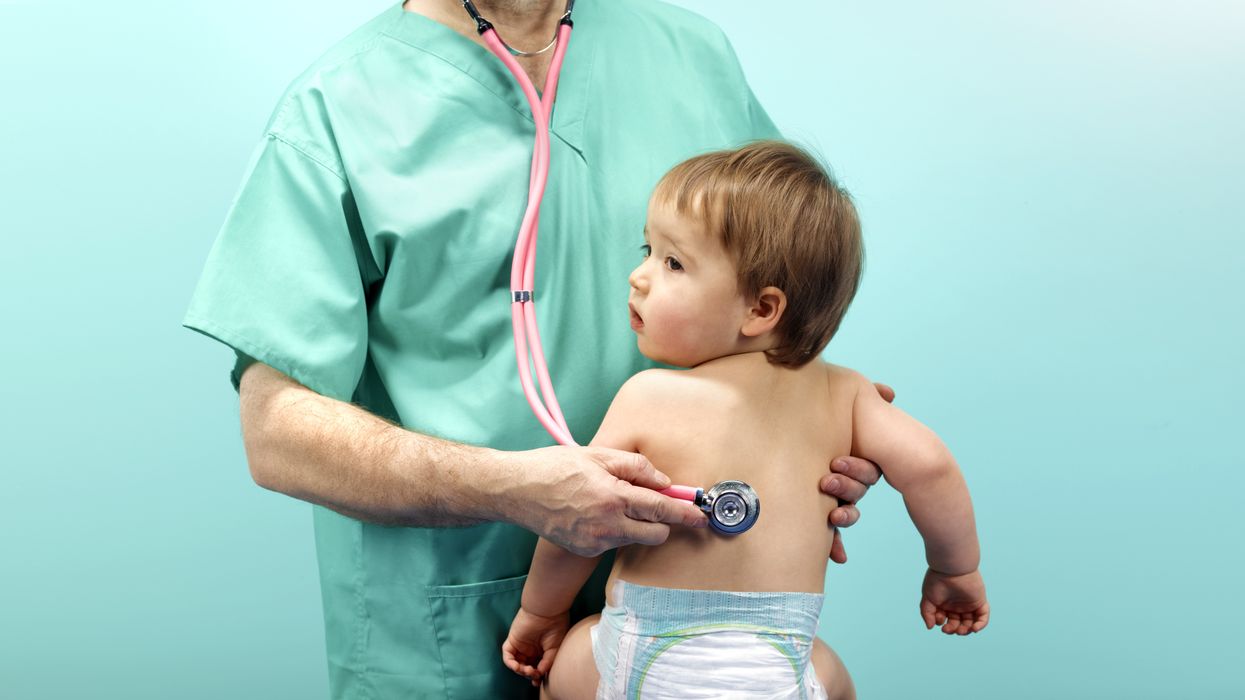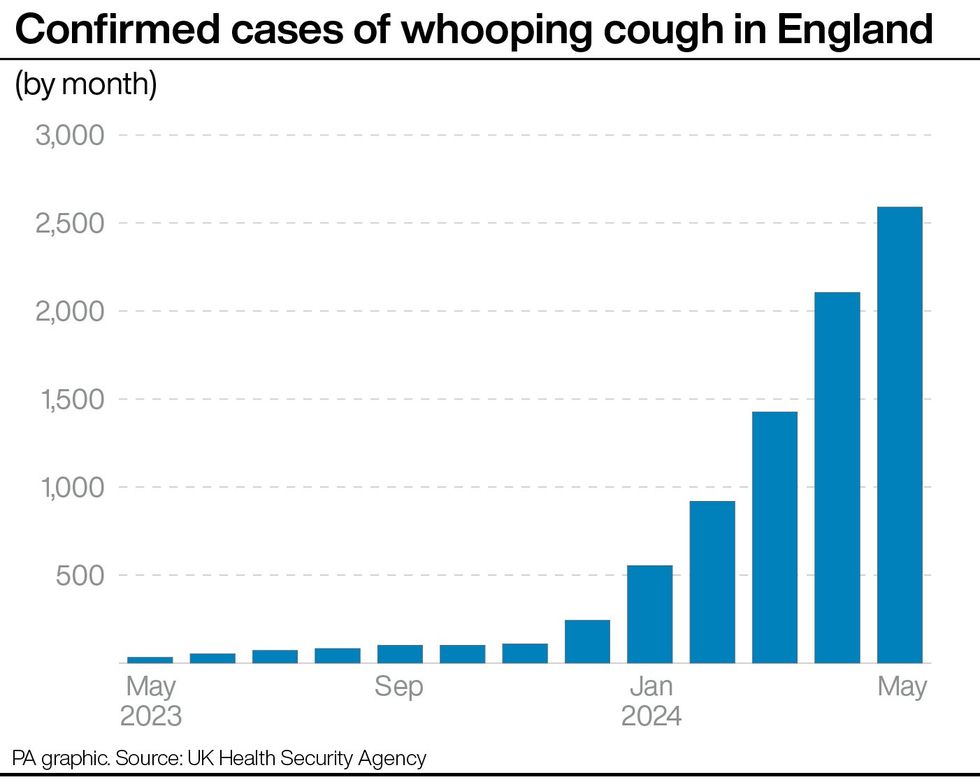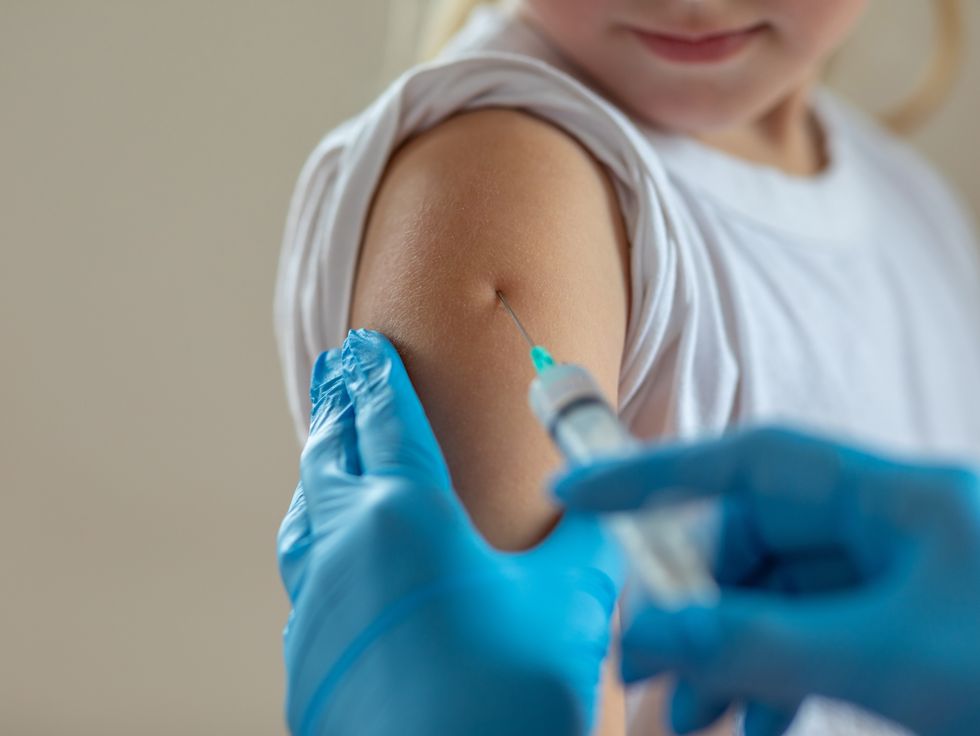Health experts issue whooping cough warning after nine baby deaths - here's what we know so far...

The UKHSA reported nine babies have been killed from whooping cough since November 2023 to the end of May
|Getty

Cases in England have risen to 2,591 in May bringing the total number this year to 7,599
Don't Miss
Most Read
Latest
Health experts have issued a warning over whooping cough as cases rise in England and the death toll has risen to nine babies.
In May there were 2,591 cases reported which was the highest monthly total for years and brought the total number of cases this year to 7,599.
Last year there were 858 cases in the whole year.
The UK Health Security Agency (UKHSA) reported that nine babies have been killed by the infection between November 2023 and the end of May.
Pregnant women are being urged to take the whooping cough jab to protect their babies.
The UKHSA also advised parents to check their youngsters are up to date with all their immunisations.
GB News spoke to health experts and professionals to compile a list of everything to know about the outbreak so far.
What is whooping cough?
Whooping cough, also known as pertussis, is a highly contagious bacterial infection of the lungs and airways.
It causes coughing bouts that can last up to two to three months, although in some cases it's more, and can make babies and young children very ill.
Symptoms of whooping cough include a cold, a runny rose, red and watery eyes, a sore throat and a slightly raised temperature.
Dr Kathryn Basford at Asda Online Doctor said: "The key difference to look out for between a mild cough and whooping cough is the intensity. Whooping cough comes in strong coughing fits, especially at night, and most notably includes a high-pitched "whoop" as you struggle to breathe.
"It can even lead to vomiting, a bright red face, and difficulty breathing. And unlike a regular cough, whooping cough is much more contagious.
"Whooping cough is spread through the air via tiny droplets when an infected person coughs or sneezes.
"Additionally, the bacteria can linger on surfaces touched by an infected individual, creating indirect transmission if someone else touches the surface and then touches their eyes, nose, or mouth."

This graph shows the number of confirmed cases of whooping cough in England
|PA
Why are cases rising in the UK?
Experts suggest that cases of whooping cough periodically rise up to every four years, according to historical data.
Douglas Jenkinson, who was a Midlands GP for 37 years, said: "The last surge failed to materialise because we were locked down for covid so inevitably when it eventually happened it was bound to be bigger than usual."
Jenkinson, who made a special study of whooping cough and documented over 700 cases, pointed to vaccines as another factor contributing to the rise of the infection.
He said: "Vaccines that have been used for 20 years are not as good as the previous sort insofar as they prevent you getting it to a large degree but don’t stop you passing it on. Vaccines should stop you getting it and stop you passing it on too.
"Numbers are also rising because modern testing makes it easier to diagnose. Cases used to go uncounted because diagnosis was uncertain. Now they are counted to a greater degree."
Dr Donald Grant, GP and Senior Clinical Advisor at The Independent Pharmacy, said that infections may also be rising due to a decrease in vaccinations among pregnant women since the pandemic.
Who is at risk of whooping cough?
Whooping cough is mostly associated with young children, however, it is possible for adults to catch the disease.
Young babies under six months of age are particularly at risk of complications of whooping cough while older children and adults typically experience milder symptoms.
Basford said: "Whooping cough can definitely be serious, especially for young babies who haven't yet been vaccinated. Younger children especially can struggle to breathe during coughing fits, leading to complications like pneumonia and in some rarer, more severe cases, death.
"Even in adults, the constant coughing can be debilitating, causing sleep problems and making daily activities tough."

Experts advice al babies and children receive a Pertussis vaccine as part of their childhood immunisation programme
|Getty
LATEST NEWS FROM MEMBERSHIP:
How to protect yourself and children
The most effective way to protect yourself and your children from whooping cough is to get vaccinated.
Dr. Natalia Bogatcheva, GP at The London General Practice advised all babies and children to receive a Pertussis vaccine as part of their childhood immunisation programme.
Pregnant women who can pass antibodies to their babies should also take the vaccine to protect them until the vaccination program takes effect.
Bogatcheva said: "It is very safe and is a highly effective vaccine. As pertussis is caused by a bacterial pathogen, Bordetella pertussis, the treatment of choice is normally an antibiotic, especially effective in the early stages of the illness."
Other ways to prevent whooping cough is to avoid contact with infected individuals and have good hand hygiene.
If you are infected there is a "role of post-exposure prophylactic antibiotics to stop the spread of the infection further."
Ways to keep well include staying warm, drinking plenty of fluids and taking simple over-the-counter medication like paracetamol and ibuprofen.
You should also call 999 or go to A&E if:
- Your child is having seizures
- You or your child have chest pain that's worse when breathing or coughing
- You or your child's lips, tongue, face or skin suddenly turn blue or grey (on black or brown skin this may be easier to see on the palms of the hands or the soles of the feet)
- You or your child are finding it hard to breathe properly










